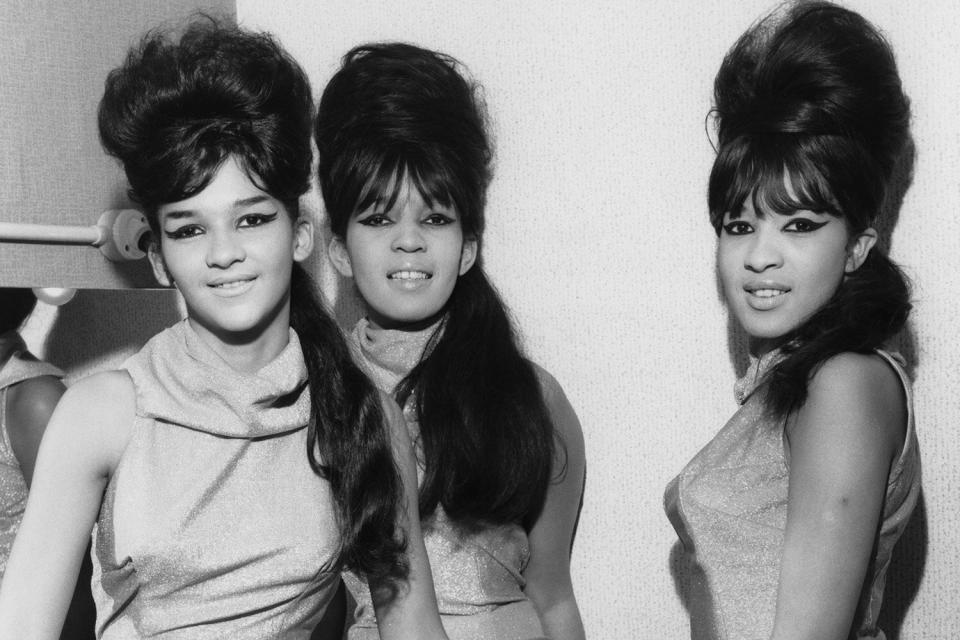Ronnie Spector, 'Be My Baby' singer and leader of the Ronettes, dies at 78
- Oops!Something went wrong.Please try again later.
- Oops!Something went wrong.Please try again later.
- Oops!Something went wrong.Please try again later.
Ronnie Spector, the lead vocalist and co-founder of the popular 1960s girl group the Ronettes, known for singing such hits as "Be My Baby," "Walking in the Rain," and "Baby, I Love You," died Wednesday after a brief battle with cancer. She was 78.
"Ronnie lived her life with a twinkle in her eye, a spunky attitude, a wicked sense of humor and a smile on her face," her family said in a statement. "She was filled with love and gratitude. Her joyful sound, playful nature and magical presence will live on in all who knew, heard or saw her."
Veronica Yvette Bennett was born in Spanish Harlem in 1943. In 1957, with her sister Estelle and cousin Nedra Talley, she formed the Darling Sisters, who underwent a series of lineup changes involving several cousins and a name change to the rather ungainly Ronnie and the Relatives before finally becoming the Ronettes.
Their first single, "I Want a Boy," was released under Ronnie and the Relatives in 1961, to little success. After a few more singles stalled, Estelle called up producer Phil Spector to solicit an audition for the Ronettes. The rest, as they say, is rock & roll history.

R. H. Vincent/Redferns/Getty Images The Ronettes
In July 1963 the Ronettes released their biggest hit, "Be My Baby," now widely regarded as one of finest songs of the 20th century. Composed by Phil Spector, Jeff Barry, and Ellie Greenwich, "Be My Baby" reached No. 2 on the Billboard Hot 100. It was inducted into the Grammy Hall of Fame in 1999 and added to the United States National Recording Registry in 2006.
Speaking to EW in 2016, Ronnie recalled the first time she heard the completed track. "I was on tour with the Ronettes, opening for Joey Dee & the Starliters, when I heard the [final version of the song]," she said. "We were in bed watching Dick Clark's American Bandstand, half sleeping, and Clark says, 'This is going to be the next record of the century!' And we hear 'Be My Baby'! We jumped up, and we were, like, dizzy. [Then] we went for a swim. It was great."
Phil Spector was eager to issue a follow-up to "Be My Baby" and responded with "Baby, I Love You," which Ronnie recorded with Darlene Love and the Blossoms and Sonny and Cher subbing in for Estelle and Nedra on background vocals. In November 1963, the Ronettes appeared on the Christmas album A Christmas Gift for You From Phil Spector, which included their classic takes on "Frosty the Snowman," "Sleigh Ride," and "I Saw Mommy Kissing Santa Claus."
Success for the Ronettes was short-lived, though. After 1964's "Walking in the Rain," the group struggled to score another hit, even though they opened for the Beatles on an American tour in 1966. The Ronettes broke up the following year and Ronnie attempted a solo career, but Spector stymied her chances at every turn.

Jordi Vidal/Redferns Ronnie Spector
Ronnie began an affair with Spector in 1963, though she didn't know at the time that he was married. He divorced his wife in 1965 and wed Ronnie in 1968, at which time she changed her surname to Spector. The couple adopted a son, Donté Philip, in 1969, and twins Louis and Gary two years later.
Living with Phil Spector was a waking nightmare for Ronnie, who described years of psychological torture in her 1990 memoir, Be My Baby. She finally escaped with the help of her mother in 1972 and filed for divorce in 1974.
Ronnie Spector had a renaissance in the '80s, thanks in large part to a guest vocal spot on Eddie Money's 1986 hit "Take Me Home Tonight." In 1988, the Ronettes sued Spector for nonpayment of royalties. After a protracted legal battle, Phil Spector ended up paying Ronnie more than $1 million dollars in royalties. (Phil Spector died last year, at 80.)
Ronnie Spector continued to record and perform throughout the 2000s, as the Ronettes also enjoyed a resurgence in popularity and respect. They were inducted into the Vocal Group Hall of Fame in 2004 and the Rock and Roll Hall of Fame in 2007.
Related content:
